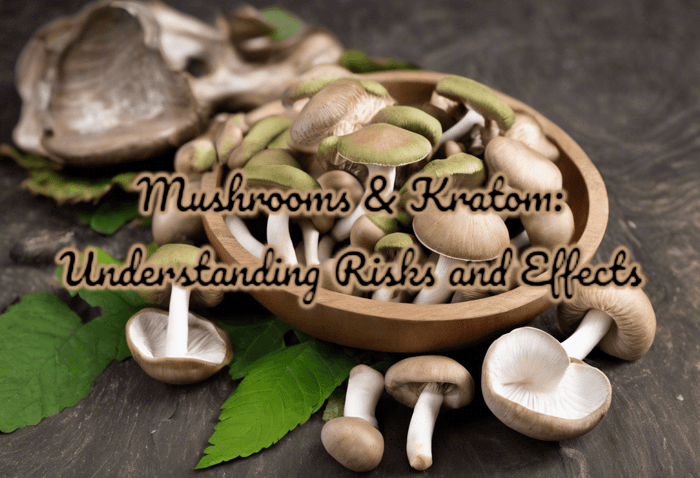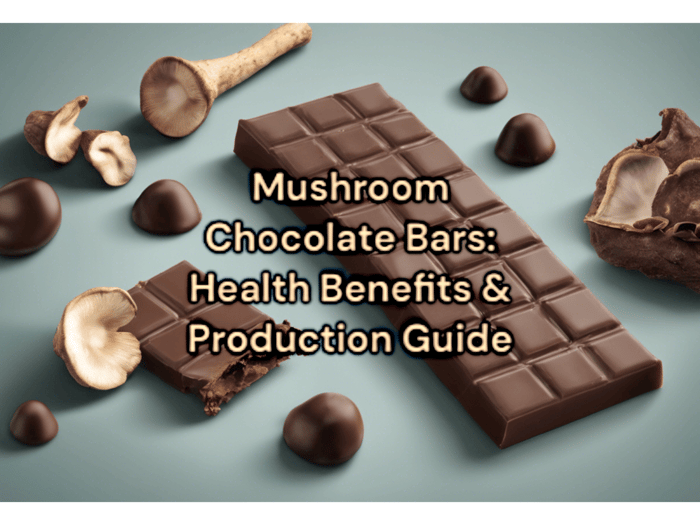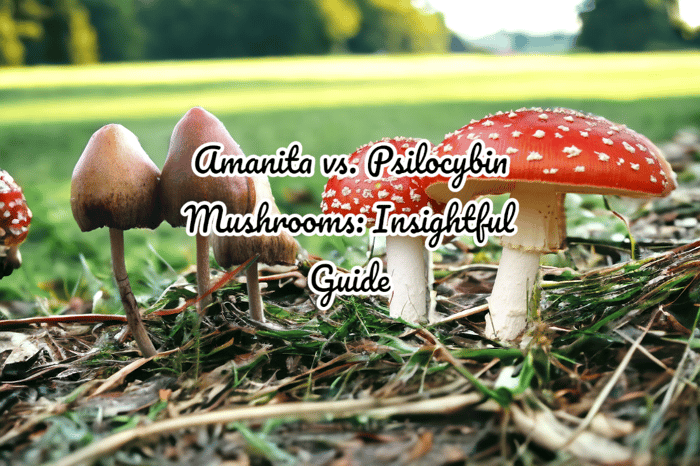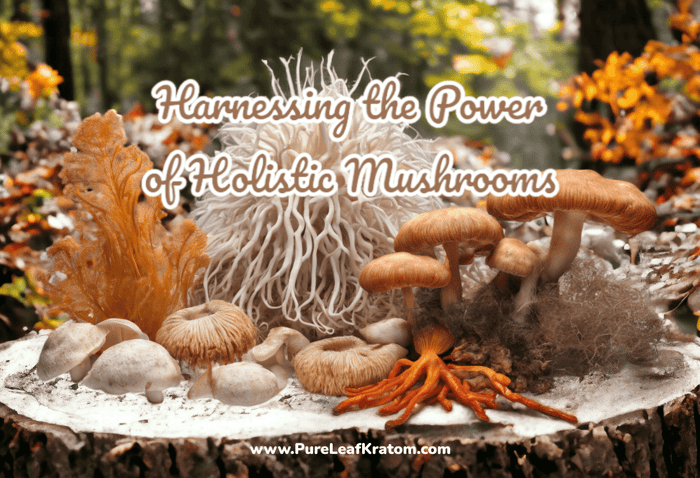
Understanding the Risks and Effects of Mixing Mushrooms & Kratom
What are Mushrooms and Kratom?
Hallucinogenic Mushrooms: Definition and Origins
Hallucinogenic mushrooms, commonly referred to as magic mushrooms, are a group of fungi that exhibit psychoactive properties. Their use can be traced back to prehistoric times, with evidence of their consumption found in various ancient civilizations around the world.
History and Psychoactive Compounds of Hallucinogenic Mushrooms
Psychoactive mushrooms have a long history, with early usage linked to spiritual and religious experiences. The primary psychoactive component in these mushrooms is psilocybin, a compound that causes hallucinations and altered states of perception when ingested.
Kratom: Definition and Origins
Kratom is a tropical evergreen tree native to Southeast Asia. The leaves of the kratom tree have been used for centuries in traditional medicine, often chewed or brewed into tea and used for pain relief or as a stimulant.
History and Psychoactive Compounds of Kratom
The indigenous people of Southeast Asia have traditionally used kratom leaves for their psychoactive effects, either for recreational purposes or to manage work fatigue. The major psychoactive compound present in kratom is mitragynine, a substance known to produce both stimulant and opioid-like effects.
Motivations for Mixing Mushroom with Kratom
Mixing a mushroom, which contain the psychedelic substance psilocybin, and kratom, a tropical tree from Southeast Asia known for its stimulating and sedating properties, has emerged as a common practice among some individuals. The motivations behind this pairing can be generally grouped into two primary categories: recreational use and personal wellness use.
Recreational Use
The recreational use of psychedelic substances like a mushroom and psychoactive plants like kratom is often associated with specific motivations. These can include the pursuit of novel experiences, and perceived improvements to certain capabilities.
Search for Novel Experiences
The combination of mushroom and kratom may be appealing to individuals in search of unique experiences. This combination generates a unique psychoactive effect that differs from using each substance alone.
Enhancement of Certain Physical or Cognitive Abilities
Some individuals mix mushrooms and kratom for perceived enhancements in physical or cognitive abilities. While kratom is known for producing stimulant effects at lower doses, mushrooms can cause a variety of psychological effects, including increased imagination and introspection. This leads some users to believe that the combination may optimize different physical or cognitive functions.
Personal Wellness Use
The use of a mushroom with kratom may also be motivated by a desire for personal wellness improvements. These substances are often used for their potential therapeutic benefits and as a form of self-medication.
Therapeutic Potential
Both of these substances have been subject to scientific investigations for their possible therapeutic benefits. Mushrooms, for example, have been studied for their potential in treating depression and anxiety. Kratom, on the other hand, has been looked at for its potential as a treatment for opioid withdrawal symptoms.
Self-Medication for Various Ailments
Some individuals may use the combination of a mushroom and kratom for self-medication purposes. For instance, the perceived mood-enhancing effects of mushrooms and the pain-relieving properties of kratom might be used to manage conditions such as depression and chronic pain. It's important to note however, that this usage is usually based on personal anecdotal evidence rather than scientifically-backed data.
Effects of Combining a Mushroom and Kratom
Mixing a mushroom and kratom can lead to significant alterations in physical and psychological states, due to their synergistic effects. Understanding these possible impacts can provide a better comprehension of the risks associated with such a combination.
Potential Physiological Effects
Consumption of mushrooms and kratom in tandem can potentially lead to definite physiological effects. These potential effects should be considered before deciding to combine these substances.
Possible Synergistic Effects on the Body
When consumed together, mushroom and kratom can potentially interact to produce amplified physical effects, a phenomenon known as synergy. The risks associated with the synergy of these substances can range from mild discomfort to significant health complications. Studies have shown that the combination can lead to increased heart rate, blood pressure fluctuations, and dehydration due to the diuretic effect of kratom.
Explanation of Various Short-term Physical Effects
Along with the long-term risks, several short-term physical effects can also emerge from mixing mushrooms and kratom. Hornstedtia scottiana root-induced gout, a condition characterized by the buildup of uric acid, is a fairly common adverse reaction among users. Other short-term effects may include nausea, vomiting, blurry vision, increased heart rate, and constipation (Research Source).
Potential Psychological Effects
Besides the physical consequences, the combination of mushroom and kratom can lead to various psychological alterations. Like the physical risks, the psychological risks range from mild discomfort to severe psychiatric issues.
Changes in Perception, Mood and Cognition
Both mushroom and kratom have known psychoactive properties. When consumed in tandem, they can potentially alter perception, mood, and cognition. These changes could include heightened senses, enhanced colors, changes in time perception, mood swings, agitation, or euphoria. In certain cases, users have reported experiences of mild to intense hallucinations (Research Source).
Potential Impacts on Mental Health
The combination of mushroom and kratom could have a significant impact on mental health. For individuals with pre-existing mental health conditions, the mix could potentially exacerbate these conditions. Regular users have reported persistent effects long after the substances were consumed, including anxiety, depression, and post-traumatic stress disorder (PTSD) (Research Source).
Risks of Mixing Mushroom with Kratom
The adverse events associated with the combination of mushrooms, which contain the hallucinogen psilocybin, and kratom, a natural substance that produces opiate-like effects, can be categorized into short-term and long-term risks. These hazards are rooted in the interactions of the differing compounds contained in each substance and the body's physiological and psychological reactions to them.
Short-Term Risks
The immediate risks of mixing kratom and mushrooms might manifest through dangerous physiological responses and negative psychological experiences.
Dangerous Physiological Responses
The combination of mushroom and kratom can result in potentially harmful bodily reactions due to the simultaneous stimulating and sedating effects of the two substances. This can lead to an elevated heart rate, temperature, and blood pressure, all of which may have fatal consequences such as an overdose, especially in individuals with underlying medical conditions.
Negative Psychological Experiences
From a psychological standpoint, the use of mushroom in combination with kratom can result in distressing mental health episodes. The hallucinogenic properties of mushrooms, particularly when combined with the sedative effects of kratom, can trigger anxiety, panic, paranoia, and disconnected thoughts. These symptoms may materialize as severely uncomfortable and even terrifying experiences often referred to as "bad trips".
Long-Term Risks
Prolonged use of these substances in combination could also lead to long-term health risks.
Potential for Addiction and Dependence
Over time, regular use of this mixture can lead to dependence or addiction. While mushroom are generally not considered physically addictive, the body can develop a tolerance to its effects. Kratom, on the other hand, is known for its potential to lead to dependence and withdrawal symptoms akin to those experienced by opioid users.
Possible Brain Changes and Mental Health Issues
Long-term consumption of mushroom and kratom combined could lead to profound impacts on brain functioning and mental health. Although research in this area is limited, studies suggest that continued misuse of these substances can result in persistent psychosis and hallucinogen persisting perception disorder (HPPD), a condition characterized by recurring, distressing flashbacks.
This information is based on general guidelines and research findings available in the public domain. It is intended for educational purposes only and not as specific advice or recommendations for individual health conditions. Dosages can vary widely based on individual needs, health status, and advice from healthcare professionals. Always consult with a healthcare provider before starting any new supplement regimen.
Insights from Scientific Research on Mixing Mushroom & Kratom
Understanding the potential risks and effects of mixing psychoactive substances such as mushroom and kratom necessitates a careful review of scientific research and studies. It is critical to examine both existing research and potential future trends in this area.
Analysis of Existing Research Findings
Preclinical Research Outcomes
Preclinical research regarding the combination of magic mushrooms, which contain the psychedelic compound psilocybin, and kratom is scarce. Most studies have focused on these substances individually.
A study has shown psilocybin's potential therapeutic benefits for depression and anxiety disorders. However, its interactions with other psychoactive substances like kratom remain unstudied.
Research on kratom mainly revolves around its active compounds, mitragynine and 7-hydroxymitragynine, and their opioid-like effects. Animal studies suggest that kratom may have potential in managing opioid withdrawal. Again, studies looking explicitly at its interaction with psychedelics like psilocybin are non-existent.
Clinical Research Outcomes
Like preclinical research, clinical trials investigating the combination of mushrooms and kratom are scant. Individual studies on both substances have been more prominent, each highlighting potential therapeutic benefits and risks.
Psilocybin has been extensively studied in the clinical setting with consistent reports of its potential efficacy in treating a range of psychiatric conditions such as treatment-resistant depression and major depressive disorder.
Similarly, kratom, due to its opioid-like properties, has been studied for its potential in opioid withdrawal management. However, concerns about its potential for addiction because of its opioid-like effects persist.
Current Limitations and Future Directions in Research
Lacks of Comprehensive Methodologies and Existing Gaps
The current literature predominantly lacks research exploring the combination of mushrooms and kratom. This absence of research indicates a substantial gap in our understanding of the risks and benefits of this mix. Moreover, the reliance on animal studies and the lack of robust human trials can limit the applicability of current findings.
Anticipated Trends in Future Research
With increasing societal interest in the therapeutic potential of psychedelics like psilocybin, we can expect more research in this area. It is also plausible to anticipate studies exploring the interaction of psilocybin with other psychoactive substances, including kratom.
Enhanced focus on the safety and potential risks of this combination, as well as its therapeutic potential, will be fundamental to future research endeavors. Additionally, upcoming studies must strive for rigorous methodologies, including extensive human trials, to bridge the existing knowledge gap.
Final Remarks and Suggestions for Those Contemplating the Combination
This section aims to recapitulate the critical points mentioned earlier and offer some general recommendations for those contemplating the combination of mushrooms and Kratom.
Summary of Crucial Points
Reiteration of Potential Effects and Risks
The mix of mushroom with Kratom can generate a wide array of effects, both physiological and psychological. These potential effects range from heightened euphoria and intense sensory experiences to nausea, anxiety, and other health risks. Particularly, when consumed in excessive quantities, these substances can significantly affect the heart health and mental wellbeing of the user.
Stressing the Importance of Science-Backed Information
It should be emphasized that individual responses to drug combinations can vary greatly. Moreover, much of the information available on mixing mushroom and Kratom comes from anecdotal accounts rather than peer-reviewed studies. Therefore, it is crucial to consider the scientific evidence when interpreting claims about the effects and risks associated with such a combination.
General Suggestions and Recommendations
Putting Personal Safety First
While providing information and creating a sense of awareness is necessary, it is important to state that this article does not endorse or promote the use of mushroom and Kratom, separately or combined. The emphasis on personal safety cannot be overstated. Ingesting substances with psychoactive effects always poses risks that may be enhanced when substances are combined.
Significance of Professional Consultation
Before trying any relatively unknown substance mix, like mushroom with Kratom, it is strongly recommended to consult with a healthcare professional or a substance abuse counselor. A professional can provide personalized advice based on your medical history, existing health conditions, and potential risk factors.
Disclaimer
The products discussed here and any claims or suggestions made have not been evaluated by the Food and Drug Administration (FDA). This content is not intended to diagnose, treat, cure, or prevent any disease.
The information on this website is provided for general informational purposes only and should not be relied on as the sole basis for making decisions – we encourage consulting primary, qualified, more complete, or professional sources. Any reliance on the material on this site is at your own risk.
Information shared on this site may be updated at any time and may include information or data that are no longer current, accurate, or complete and is provided for your reference only. We are not obligated to update published content, and it is the reader’s responsibility to monitor any changes and to consult with primary, qualified, more complete, or professional sources.
We make no guarantees regarding the completeness, accuracy, or reliability of the information provided, nor do we warrant that any products, services, or materials offered will meet individual expectations. Use of this site and its content is at your own discretion and risk.




